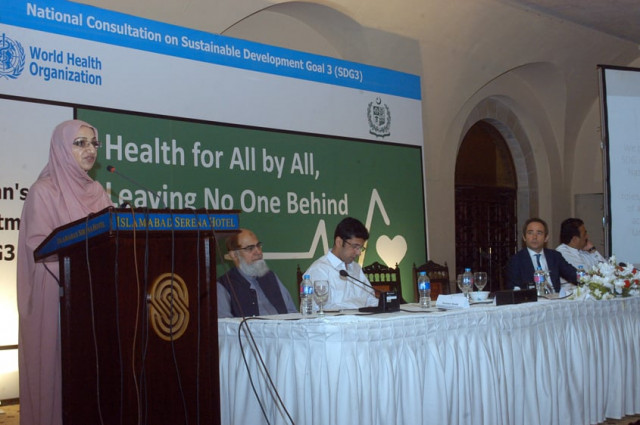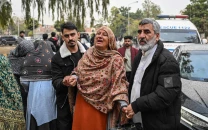Achieving heath-related targets: ‘Equity critical to ensuring quality healthcare’
Centre, provinces, development partners pledge to meet targets

The prime minister announced the construction of a number of new hospitals across the country which would add more than 10,000 beds to the existing pool. PHOTO: WASEEM NAZIR/EXPRESS
The pledge came on Wednesday at the first national consultation on the SDGs which was organised by the Ministry of National Health Services, Regulations and Coordination (NHSRC) and the World Health Organisation (WHO) to advocate for implementation of SDGs.
The focus of the discussion was to align targets under health-related SDGs with national health priorities and Vision 2025.
The SDGs are 17 goals with 169 targets that UN member states have agreed to try to achieve by the year 2030.
Health has a central place in SDG 3. The new goals build on the Millennium Development Goals and aspire to ensure health and wellbeing for all, including a bold commitment to end the epidemics of AIDS, tuberculosis, malaria and other communicable diseases by 2030.
It also aims to achieve universal health coverage and provide access to safe and effective medicines and vaccines for all. Supporting research and development for vaccines is an essential part of this process as well as expanding access to affordable medicines.
Pakistan has made progress but faced many challenges in making progress on the MDGs and lagged behind in achieving MDG targets, said NHSRC Minister Saira Afzal Tarar.
She maintained that the concept of equity is critical to ensuring that quality healthcare reaches all who need it. The chronic and catastrophic disease remains one of the main factors that push households from poverty into deprivation.
To provide free healthcare to the poor segment of society, she said, Prime Minister’s National Health Program was launched in December last year through a cashless scheme. Till date, 180,000 families have been enrolled in different districts. More than 4,500 patients have benefitted from treatment facilities including cardiac surgeries, cancer and other major diseases.
She identified the availability of infrastructure and hospital facilities to improve the existing patient-bed ratio as another area of intervention. The prime minister announced the construction of a number of new hospitals across the country which would add more than 10,000 beds to the existing pool. It will enhance the patient-bed ratio to more than 0.7 per 1,000 persons, she said.
“Universal health coverage is a key to achieving SDGs for health in Pakistan and it requires synergies and collaborations across the board, leaving no one behind in terms of health care access,” said WHO Pakistan Representative Dr Michel Thieren.
He assured WHO’s commitment to support Pakistan’s efforts to achieve the targets.
Published in The Express Tribune, September 8th, 2016.



















COMMENTS
Comments are moderated and generally will be posted if they are on-topic and not abusive.
For more information, please see our Comments FAQ